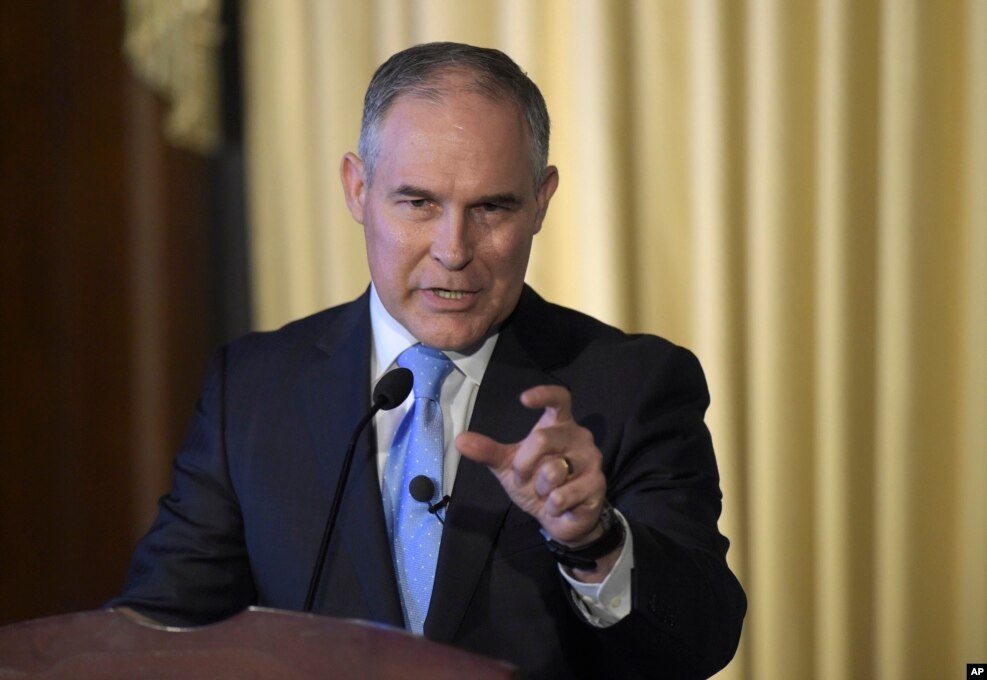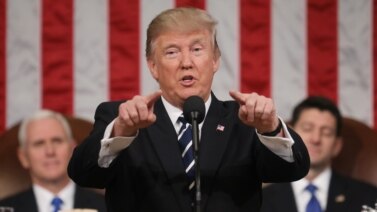
United States officials have enforced a law called The Clean Air Act for more than half a century.
The measure gives the federal government power to control air pollution across the country.
Since 1963, the Clean Air Act has helped clean the air Americans breathe, control acid rain, and slow reductions in Earth's ozone layer. The ozone layer helps protect people and other living things from the sun's harmful radiation.
In recent years, Presidents George W. Bush and Barack Obama used the act to control carbon dioxide and other greenhouse gases. Studies have linked those gases to rising temperatures and changes in Earth's atmosphere.
Obama, in particular, sought to limit the amount of carbon dioxide American power stations could produce.
But President Donald Trump is not likely to continue on that path. Trump has questioned the reality of climate change. And, he suggests that federal environmental rules are hurting American businesses.
Environmental regulations under Trump
Trump is reportedly preparing to use executive orders to overturn some of Obama's policies on air and water quality. He already issued one this week: an order to cancel the Clean Water Rule.
The rule lets the federal government define what waters are protected under environmental regulations - such as small streams and wetlands that connect to a larger ecosystem.
Federal officials say the rule is meant to help landowners understand when to ask for government approval.
But critics say the Clean Water Rule gives the government too much power.
As Trump signed the executive order to repeal the rule, he said environmental regulators were "putting people out of jobs by the hundreds of thousands."
"It's a horrible, horrible rule," he said. "Has sort of a nice name, but everything else is bad."
The EPA under Trump
Trump has also appointed someone who is not sure that people cause climate change to lead the U.S. Environmental Protection Agency. The EPA is the federal agency that makes sure the regulations created by the Clean Air Act are followed.
Before he became the EPA's director, Scott Pruitt took the agency to court more than a dozen times.
As the top lawyer for the state of Oklahoma, he argued the federal government did not have the power to control greenhouse gas emissions as much as it did.
Pruitt spoke to EPA workers last month. He said the EPA and the nation can support energy, jobs, and the environment. We do not need to choose, he said.
More recently, Pruitt told conservative political activists that the EPA does some important work on air and water quality. But, he said, the Obama administration was so concerned about climate change that it neglected those activities.
Another one for the courts?
Supporters of rules aimed at slowing climate change say questions about the EPA's authority will likely end up in the courts.
Tomas Carbonell is with the Environmental Defense Fund, a not-for-profit group. He says the Clean Air Act is one of the strongest examples of environmental legislation in the world.
Carbonell says the act has also “made the U.S. a global leader in pollution control technologies that are really helping to generate investments and jobs here at home."
He is sure that EPA programs have strong legal and scientific support. He notes the U.S. Supreme Court has ruled three times that the Clean Air Act gives the EPA the right to deal with the threat of climate change.
But in 2016, the Supreme Court stopped a piece of climate change legislation. That measure would have forced U.S. power centers to cut their pollution by one-third.
The Court said the law has to wait until a lower court decides whether the EPA has the right to make those new regulations.
Now, under the new Trump Administration, it is unclear what will happen.
In a speech to conservative activists last week, Trump said he would protect the environment. He has yet to say what steps he plans to take.
I'm Anne Ball.
Kelly Jean Kelly wrote this story for VOA Learning English. George Grow was the editor.
Words in This Story
acid rain - n. rain that contains dangerous chemicals because of smoke from cars and factories
ozone layer - n. a layer of ozone in the upper atmosphere that prevents dangerous radiation from the Sun from reaching the surface of the Earth
greenhouse gas - n. a layer of gases, such as carbon dioxide, that trap the warmth from the sun in the Earth's atmosphere
executive order - n. an order that comes from the U.S. president or a government agency and must be obeyed like a law
ecosystem - n. a community of organisms and their surroundings that act as a unit
regulator - n. people who oversee enforcement of an official rule or law
emission - n. producing or sending out something, such as energy or gas
authority - n. the power to give orders or make decisions : the power or right to direct or control someone or something
